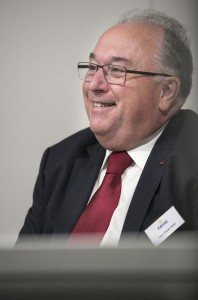Fayat’s forward view – at bauma 2019
First published at bauma - April 16, 2019
Digitalisation and technology are key issues for the construction machinery business, areas that the Fayat Group is keen to invest in at present. The firm is introducing an array of new machines and models across its product lines, with highly sophisticated systems being core components.
Jean-Claude Fayat is CEO of the Fayat Group and said, “We have to work on digitalisation for everyone. I am sure that the big development in equipment will come from this digitalisation.”
He said that one important step for the firm is the agreement settled recently between its road machinery businesses BOMAG and Dynapac, with Volz Consulting. This covers the BPO logistics technology developed by Volz Consulting, which is designed to help contractors organise operations efficiently and also to recover as-built data from equipment in real-time.
The BPO package is one of a range of solutions being offered on machines from the Fayat Group that are intended to optimise construction operations and boost overall efficiency. The firm is keen to offer more such solutions, whether developed internally or through partnership with other firms, and Fayat added, “We will have systems that are helping the driver with the job.”
Machine autonomy is another area where the Fayat Group is involved in technologically advanced projects. The firm is working with Trimble on autonomous compaction machine prototypes, but does face future challenges in this respect. Fayat said, “On the technology point of view, we are nearly ready. But is the market ready to accept such a machine?”
He said that the rules and regulations around the use of autonomous machines have yet to be defined however, presenting a limiting factor on their introduction to construction. He commented, “In case of an accident, who is responsible?”
While crashes with manually operated equipment do occur and do cause injuries and fatalities onsite, this is a recognised problem. However Fayat commented, “We are not ready to accept the same thing if it is coming from a machine.”
Improving working safety for construction personnel is another key issue for the Fayat Group. The autonomous machines could deliver such safety gains, but the regulatory boundaries have to be defined. And new rules and regulations will have to be established concerning the use of autonomous construction machines. While autonomous machines are being used already in mining, Fayat pointed out that these are operated in areas where access is strictly controlled, and typically a long way from population centres. Fayat does see a future for autonomous machines in the construction industry and said, “It will come, but the question is when?”
Similarly, the Fayat Group is also prioritising the environment and Fayat said, “There is an environmental problem and it is our duty to take care of that.”
As part of this, the company is investing in developing recycling technologies. For example its Marini and Marini-Ermont asphalt plants are now able to use higher quantities of recycled asphalt pavement (RAP) than ever before, while producing far lower exhaust and noise emissions.
There is a huge potential for increased use of RAP in road construction and Fayat said, “In France less than 20% of RAP is used.” He explained that the comparatively low cost of virgin materials in France has slowed the utilisation of RAP.
Fayat said that in Germany, where there are now more regulations requiring the use of RAP, around 40% 25% of this is now used. In the Netherlands RAP use is higher still, at around 60% 40%. He commented, “But in the Netherlands, virgin materials are very expensive traditionally compared with France, where they have been much cheaper.”
However the company is looking ahead to increasing the use of RAP to 100%, which is why the firm has developed equipment such as its new Master Tower and TRX plants. Europe is by no means the only market where environmental factors are being regarded as import for construction, with RAP use also prevalent in the US road building market. And in China, the authorities are keen to boost RAP use as well as cutting down on asphalt plant emissions, for which the Fayat Group is well placed to meet demand.
Looking ahead, Fayat believes also that developing environmental solutions offers potential commercial opportunities, for technology developers, equipment manufacturers and for construction companies.
Companies in this article
Fayat Group
Product Launch Videos
Most popular news
- Fayat’s forward view – at bauma 2019
April 16, 2019 - Hitachi’s ZX65USB-6 mini excavator works harder with less fuel
April 15, 2019 - Komatsu boost fuel efficiency with its WA475-10 wheel loader
April 15, 2019 - Smiley Monroe launches conveyor belt page turner at bauma 2019
April 12, 2019 - Topcon’s sophisticated head-up display goes on show at bauma 2019
April 12, 2019 - Liebherr’s innovative piling rigs at bauma 2019
April 12, 2019












